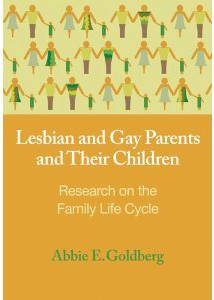Lesbian and Gay Parents and Their Children: Research on the Family Life Cycle

Book examines children of sexual minority parents
(February 2011 Issue)
“Lesbian and Gay Parents and
Their Children: Research on the Family Life Cycle”
By Abbie E. Goldberg
American Psychological Association
Washington, D.C., 2010
By Paul Efthim, Ph.D.
“The Kids Are All Right” is the name of a superb motion picture starring Annette Benning and Julianne Moore about a lesbian couple and their two teenaged children, but it could also serve nicely as the unofficial subtitle of this excellent book on the same subject.
The implied question, of course, is: What is it like for children to grow up with gay or lesbian parents? Psychology professor Abbie Goldberg of Clark University in Worcester, Mass. seeks to answer this and other related questions at the center of the oppressive “culture wars” by providing a comprehensive review of the research on same-sex parenthood and family life.
Goldberg, an award-winning early career psychologist who studies diverse families, lays out the evidence and comes to the conclusion that, essentially, the kids are alright. Children of sexual minority parents develop normally and share the same overall level of emotional adjustment as children of heterosexual parents. They also tend to have more flexible notions about gender, sexuality and family.
The author to her credit takes a hard-nosed empirical look at the possible downsides and upsides of growing up with sexual minority parents. These children may be more likely to be teased by peers and even adults. (However, this reality also applies to children from other atypical family structures, such as single-parent, mixed-race and disabled couples). Fortunately, the negative effects of homophobia and heterosexism on children’s experiences seem to be buffered by the degree to which such kids know other families like their own and have opportunities to interact with them.
Recent family research suggests that some kids feel a particular type of pressure to succeed in response to stereotypes about sexual minorities (for example, “gay parents raise gay kids”). Particularly in adolescence, youth with gay or lesbian parents may be at risk to bottle up their own personal struggles because of a felt need to prove how normal they are. (Interestingly, children of gay or lesbian parents do not appear to be significantly more likely to identify themselves as gay or lesbian than children of heterosexual parents. They do, however, report a much easier time coming out to their parents if they do happen to be gay or lesbian.)
Beyond looking at the kids, this volume also examines other important questions such as the social-legal context for same-sex couples, social support and the complexities surrounding adoption for those couples who choose that route. Goldberg organizes the book to follow the family life cycle, beginning with a look at how gay and lesbian couples build relationships and negotiate the decision to have children, followed by a review of research on raising children and concluding with the voices of young and older adults reflecting on the experience of growing up with gay or lesbian parents.
This book also identifies a vast number of understudied research areas, such as the experience of children of gay fathers; adopted children who are of a different race than their gay or lesbian parents; coming out to others about one’s parents’ sexual orientation; families with bisexual or transgender parents. Practitioners will be intrigued by the consideration of complex issues of self-definition and identity such as whether straight adult children of gay parents are entitled to claim membership in the wider “gay community.”
Goldberg also offers a number of practical recommendations and resources. Of special interest is the organization COLAGE (Children of Lesbians and Gays Everywhere) which offers online support at colage.org and has chapters throughout North America, including Boston, Mass. and Connecticut.
This sophisticated yet readable book is highly recommended to mental health clinicians, educators, policymakers, researchers and current or prospective gay or lesbian parents and their offspring.
Paul Efthim, Ph.D. is a licensed psychologist in private practice in Brookline, Mass. and holds a faculty appointment at the Boston Institute for Psychotherapy.
Learn more about the book: Lesbian and Gay Parents and Their Children: Research on the Family Life Cycle (Contemporary Perspectives on Lesbian, Gay, and Bisexual Psyc)
